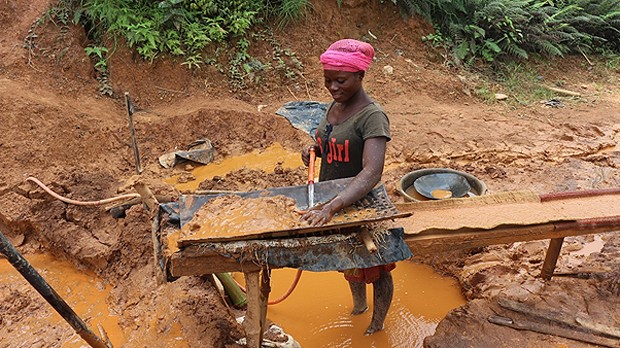The Environmental Protection Agency (EPA) in collaboration with the country’s development partners (DPs) have commenced a new project, planetGold+, as part of efforts to ensure an inclusive and responsible mining environment.
The project, which is part of a global initiative funded by the Global Environment Facility (GEF), seeks to make small-scale gold mining safer, cleaner and more profitable – a move that is expected to significantly reduce the environmental challenges of mineral exploitation.
Ghana is one of Africa’s largest gold producers, with the artisanal and small-scale mining (ASM) sector directly employing an estimated one million people. The sector supports about 4.5 million people’s livelihoods. However, most of these miners in the country operate informally, leading to concerns on environmental and human safety.
It is on the back of these that development partners, including the United Nations Development Programme (UNDP), United Nations Industrial Development Organisation (UNIDO) and the UN Environment and Conservation International, have stepped in to support ongoing efforts at promoting a safer and responsible environment while helping to formalise the sector.
The planetGold+ project seeks to advance formalisation of the sector and improve access to finance while accelerating the creation of responsible mineral supply chains.
The project also aims to enhance the uptake of mercury-free technologies by investing in knowledge-management, communications and local capacity-building.
Executive Director of EPA, Dr. Henry Kwabena Kokofu, speaking at the project inception workshop said: “We want to ensure a cleaner and safer small-scale mining space by reducing mercury-use, and also formalise the sector to advance responsible small-scale mining”.
For his part, the UNDP Resident Representative in Ghana, Angela Lusigi, observed that: “Transforming and improving the productivity in this sector by using greener technology and strengthening the value chain will help address the current strain on our forest landscapes, protected areas and inland waterways”.
To this end, he said, the UNDP is proud to be working with partners on the project. The project, titled ‘Advancing formalisation and mercury-free gold in Ghana’, is expected to help protect human health and the global environment – per objectives of the Minamata Convention on Mercury – by minimising risks posed by chemical-use in the artisanal and small-scale gold mining sector.
It will likewise strengthen capacity to ensure compliance with the Minamata Convention per its national environmental and formalisation policies.
The National Programme Coordinator-Environment and Energy of the UNIDO Regional Hub in Nigeria, Oluyomi Banjo, opined that: “Effective implementation of the project will not only safeguard the environment, especially those around mining communities, but also boost Ghana’s global trade in gold”.
The project will be implemented over five years from 2022 to 2027, with the overall vision of contributing to a clean, global supply of gold from small-scale miners.
The planetGold programme works in partnership with governments, the private sector and artisanal mining communities to significantly improve the production practices and work environment of artisanal and small-scale miners.
By working to close the financing gap, supporting formalisation, raising awareness and connecting mining communities with mercury-free technology and formal markets, the programme aims to demonstrate a pathway to cleaner and more efficient small-scale gold mining practices that benefit everyone – from mine to market.










